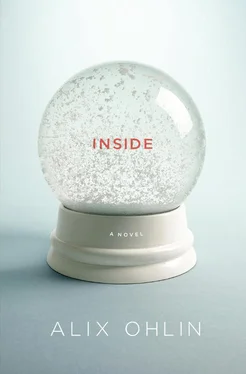Anne would deliver a bowl of her favorite flavor, chocolate, with sprinkles on top. If someone had told her a year earlier that she’d be serving ice cream to a strange girl in her apartment, she wouldn’t even have laughed. But now this stranger took it without thanking her and pointed at the screen, where a sitcom family was hashing out their differences over the kitchen table, the laughs ceding to a heart-to-heart talk, the teenage kids expressing contrition and shame.
“God, I’m glad I don’t live there ,” Hilary said.
Anne nodded. “Me too.”
Success came when she was least interested in it, much less desperate for it. This gave her a nonchalant confidence, an ability to take risks, that made her a better actress. The director loved her performances so much he wanted to die every single night. He also floated the idea of sleeping with her, which Anne previously would have considered the cost of doing business. But now she turned him down and he didn’t seem to hold it against her, just renewed his efforts every once in a while, as did others in the cast and crew, confirming that she’d become a valuable commodity.
Her phone rang with offers to audition, to join workshops, to pose for photographs. Apparently what she’d heard about one break was true, how momentum starts and picks up speed. Three agents contacted her; two took her out for expensive lunches. She had new head shots made. The run on the current play was extended. Anne basked in all of it, and each night she stretched herself out, emotionally naked, unafraid, in front of the audience. Once it came to her, the attention she’d been fighting for during these months of struggle (now that they were past, she could admit that’s what they’d been) felt destined, nothing less than her due.
The guy she’d been seeing, Magnus, only got sweeter in the face of this success. He took her out to dinner to celebrate; he brought flowers to every Saturday-night performance; he made all his friends come see the play and then stay for drinks with Anne afterward. On off nights, he had her over to his place and cooked dinner. The only problem was that he asked questions she wasn’t inclined to answer. In New York people seemed to take intense pleasure in laying out their romantic and family histories to one another. You were supposed to be open about everything — even your neuroses; especially your neuroses — and chart a map of your interior life.
Anne couldn’t do it. She didn’t like to talk about her family and said only that she had left home at a young age and wasn’t in touch with them. She might have been able to get away with this, because Magnus was falling in love with her and she could tell he was constructing his own version of her life story in his mind. Her reticence must have been rooted in a tragic past, and the details of her survival would be coaxed out of her only by the right person at the right time. He was willing to wait and prove to her that he was that person, the long-awaited prince who could wake her with a kiss.
The other problem, though, was her apartment. He had walked her to the building several times, but she never let him come up. Anne could see why this bothered him, but she couldn’t let him know about Hilary and Alan. That was just too hard to explain. She wasn’t even sure she could explain it to herself. So she’d say, “Maybe later. I’m tired tonight. Soon.”
At first they joked about it. Magnus asked if she was extremely messy, or had a pet tiger, or — and she could hear the edge in his voice — if she was married, and she always laughed and denied everything.
What he said was, “I don’t want to make this a condition. I’m not into demands or anything, but I just think it’s a little weird. If this is how you want it, Anne, okay, but …” The final word was always but . It was probably the last word he ever said to her. Things between them didn’t so much end as slip away. He stopped coming to every show, then stopped coming at all, and she let him go with more regret than she’d anticipated. He would have been the perfect man for some other, better version of herself.
It was Anne who found a doctor for Hilary, because as far as she could tell the girl had made no effort to do so. She was so strong-willed most of the time that Anne tended to forget that she didn’t have much common sense. She treated pregnancy like a bad cold, something that called for a lot of bed rest and fluids. When Anne started asking about ultrasounds and tests, Hilary shook her head.
“I don’t have insurance,” she said.
“There are places you can go,” Anne pointed out.
“Not that I’d want to go to.”
“I don’t think you have a choice.”
Lying propped on pillows, Hilary gestured vaguely at her belly. “Women have been doing this, like, forever,” she said. “I’m young. I’m built for this.”
“Women have been dying in childbirth forever too,” Anne said.
From the other room, Alan called, “Hey! Don’t be scaring her and shit! She’s scared enough already.”
“ Are you?” Anne said.
The girl gazed back at her, blank-eyed, and shrugged. This was her apparent defense: to go blank. Whatever fear or anger was lurking inside that house, nobody would get to see.
But some things you can’t let slide. So Anne spent an afternoon calling around until she found a clinic on the Lower East Side that could offer them an appointment the next day, then told Hilary that she’d take her.
“Hey, what about me?” Alan said.
“Don’t you have to work?” Anne said, sounding more unfriendly than she’d meant to.
“I’ll take a day off.”
“What about the money?”
“It’s just money,” Alan said, looking at her like she was the one with messed-up priorities. “This is about the baby .”
“If you’re so into the baby , how come you didn’t make her go to the doctor?”
In response to this the boy flushed darkly. He was a weird kid, by turns watchful and wary, and often he seemed more like Hilary’s servant than her boyfriend. He’d flare with anger and dip into sulks, and there were days when he didn’t speak at all. Yet Anne saw clearly how her question pained him, how bad he felt, how confused and unprepared. How determined to do what was right. How helpless to do it.
He did take the day off, but Anne insisted on going too, feeling they needed adult supervision. So the three of them got on the subway together, Alan finding Hilary a seat and standing in front of her like a bodyguard. In the waiting room, Anne gathered up every available pamphlet and stuffed them in her purse. The clinic was run by a women’s health organization and staffed by earnest young college graduates wearing handwoven sweaters and political buttons. On the walls were peeling posters that seemed to have been there since the seventies. Yo amo la leche , said a happy, smiling baby. Most of the patients sat with their hands folded in their laps, staring down at their bodies as if expecting them to explain how they’d gotten into this mess.
When the nurse called Hilary’s name Anne and Alan jumped to attention, but she barely looked up, just nodded sleepily and slowly got to her feet.
They were shepherded into the tiny examination room, which was painted a dingy color between tea and coffee and didn’t seem especially clean. Anne felt a pang of panic. What if something terrible happened? What would she do? The answer came to her instantly, from her darkest, truest recesses: Run.
Alan stood next to Hilary, who was lying on the table, and held her hand. Anne knew he wouldn’t run. He might not know what to do, but he wouldn’t run. She pushed aside some dog-eared copies of Good Housekeeping and Redbook , magazines no teenage mother would want to read, and sat down in a chair.
Читать дальше












